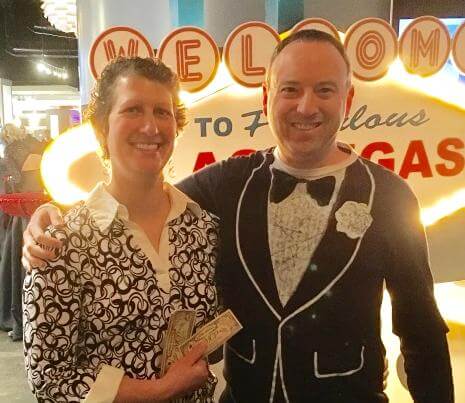Patient Perspectives: Amena, Ashley and Mary Lynn

This month we are sharing a video featuring three patients describing the impact TurningPoint has made in their lives.
Evidence Update: Impact of Walking on Breast Cancer Recurrence

Exercise has the potential to reduce the risk of breast cancer recurrence and improved survival by about 40%. Physical activity recommendations include achieving 150 minutes of moderate or 75 minutes of vigorous aerobic exercise per week, stretching, and strengthening major muscle groups at least 2 times per week. However, studies show that less than 13% of patients with breast cancer achieve this recommendation. Join us this month to learn a customized walking plan to add to your exercise program. Let us know what exercise program you might like to see at TP. Hamer et al, 2017. Lifestyle modifications for patients with breast cancer to improve prognosis and optimize overall health. CMAJ. 2017 Feb 21; 189(7): E268–E274.
Patient Perspective: George

“You have Breast Cancer”! Those words strike fear in the hearts of women who hear it – and the men too! While less than 1% of men get breast cancer, the diagnosis is no less devastating! In my case, it was even more shocking for me because the breast cancer diagnosis came 10 months after I had a robotic prostatectomy to address prostate cancer. Even though my mammogram (I can appreciate what you go through, ladies) only showed a mass on my right side, because both my nipples had inverted, and at the urging of my surgeon, I decided to have a double mastectomy. As it turns out, there was cancer in the left breast also. I feel so fortunate because so many men who find out they have breast cancer are in the later stages because they have no symptoms. When I was first diagnosed, I spent a lot of time learning about breast cancer, particularly in men. I found myself, in one breath, cursing my body for this disease, and in the next breath, thanking it for inverting my nipples. That is how I knew something was wrong. The message here is “Listen to your body!” I told my wife, “I beat prostate cancer, and I will beat breast cancer”. Even though I was confident in saying that, a cancer diagnosis has a way of making you look at life differently, including starting to think about getting your affairs in order and realizing that some things you thought were important are really not so important. The other thing I realized after both of my diagnoses, is that your life becomes a series of important decisions. What kind of treatment will you have? Who is the doctor or team of doctors to treat you? When will you start treatment? What happens after treatment? I found it so helpful to have a strong support system headed by my wife. She has been so important in both my recoveries. After my double mastectomy, my surgeon recommended TurningPoint and I am so glad he did. The staff is warm, welcoming and accommodating. Both of my therapists were great! They were knowledgeable, kind and caring, (but they still made me do the work)! My range of motion is very good and I continue to do my exercises at home (I can still hear my therapists’ voice checking on my progress)! I highly recommend TurningPoint for anyone after breast cancer surgery!
Patient Perspective: Amy

I am a stay at home mom, and when not on homework/bus stop duty, I enjoy walking with friends for exercise and company, creating photo books of family adventures, and hanging out with my husband to catch up on our similar tastes in tv and movies. I also like reading all the survivorship stories and learning of upcoming events at TurningPoint. My story started like this: After waiting a few months to get an appointment, I saw a doctor in December of 2015 to have my right breast looked at as there was some unusual swelling. After an ultrasound, I was told to find a breast surgeon who then gave me recommendations for an oncologist. After a painful biopsy, I learned I would most likely have to go through chemo, a mastectomy, and radiation (in that order). I stayed positive even though it would be a tough year of treatments. My children, now 7 and 10 years old, were a little worried but enjoyed having extra playdates and lots of yummy food that friends and neighbors brought us. My wonderful husband supported me and never showed worry or stress on his part, and even was my nurse and took care of me by having permission to work from home. After the mastectomy in the summer, the radiation doctor told me I’d need to be able to move my arms up for the radiation beams and suggested a referral for physical therapy. A few people suggested TurningPoint and I was glad to find them! My therapists taught me lots of stretches to regain movement and I improved dramatically and was able to get back to my normal range of motion. The following summer I had tissue expanders filled and returned to TurningPoint for massage therapy to help with stiffness. Everyone at TurningPoint is caring, positive, and rooting for you to improve.










